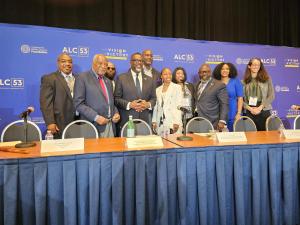Invited by Congressman Danny K. Davis, Illinois 7th District, NIC participated in a panel discussion at the Congressional Black Caucus Foundation’s Annual Legislative Conference 2024 on “The Big Picture: The Barriers to Successful Reentry.” Representing NIC was Ronald Taylor, Chief, Prisons Division.
The conference forum addressed the critical issue of reentry, emphasizing the structural challenges that formerly incarcerated individuals encounter as they attempt to reintegrate into society. The forum also explored barriers regarding housing, employment, mental health, and substance abuse and highlighted legislative and community-based solutions.
Reentry is the transitioning of incarcerated individuals in jails and prisons back into their communities, beginning on day one upon entering the institutions. The transition is fraught with complex challenges, often despite the availability of reentry programs and initiatives designed to support returning citizens. Justice-involved people face significant barriers to reintegration, making their journey toward a stable and productive life difficult. The process—which includes connecting people who were incarcerated with their families, supportive networks, housing, employment, medical services, and mental health services—is relatively new for institutions.
Over the last 15-20 years, the focus of institutions has shifted from the custody and care of its population to include a focus on reducing recidivism. Institutions are trying to understand how evidence-based programs and practices could improve reentry outcomes and public safety. Ninety-five percent of people who enter jails or prisons eventually leave them; therefore, providing successful reentry options is imperative to ensure public safety.
Unemployment, lack of housing, untreated mental health issues, and substance abuse are major drivers of recidivism. Thus, reducing recidivism and overcoming challenges to successful reentry requires a comprehensive, multi-faceted approach that addresses not only the individual needs of returning citizens but also broader social, economic, and legal systems.


